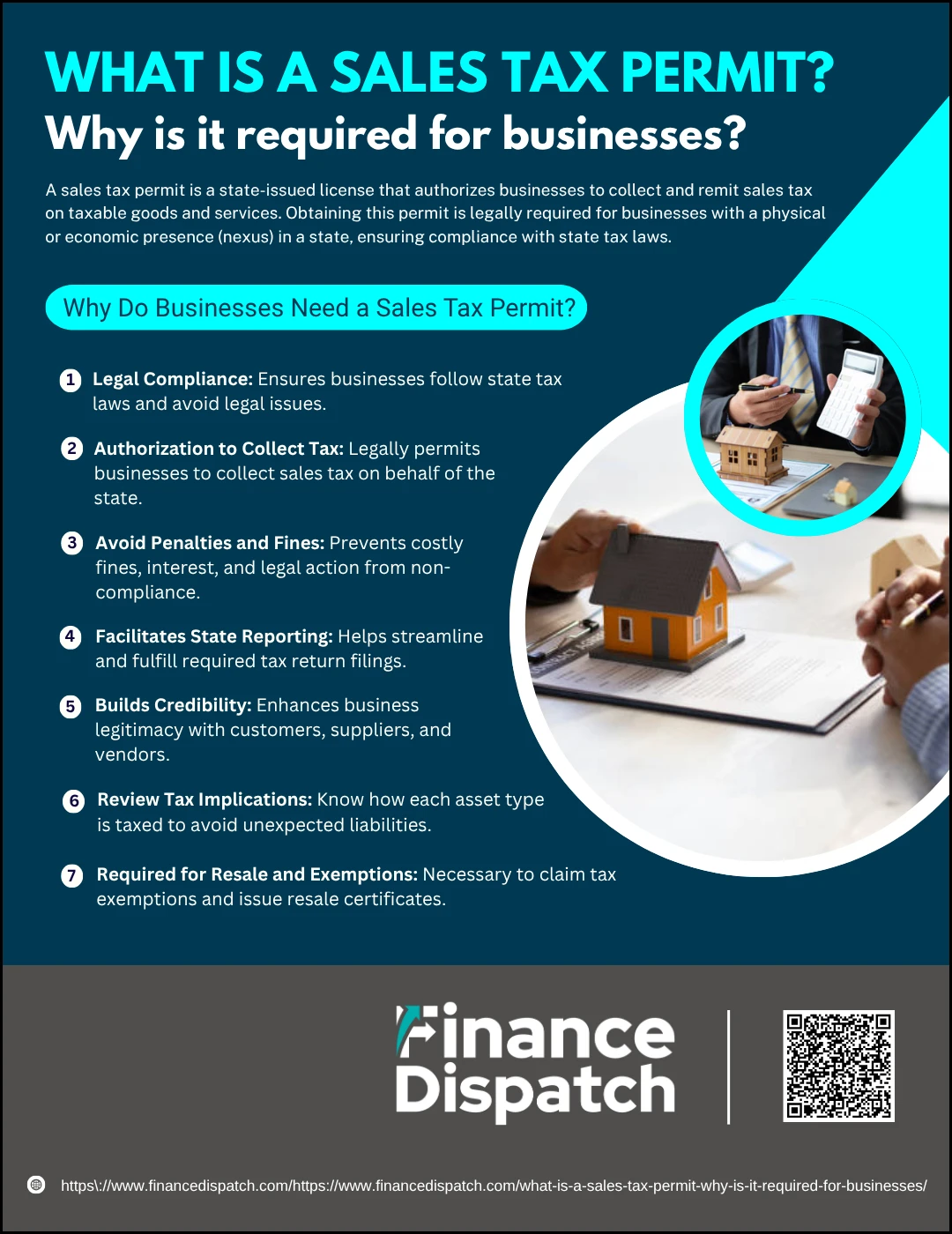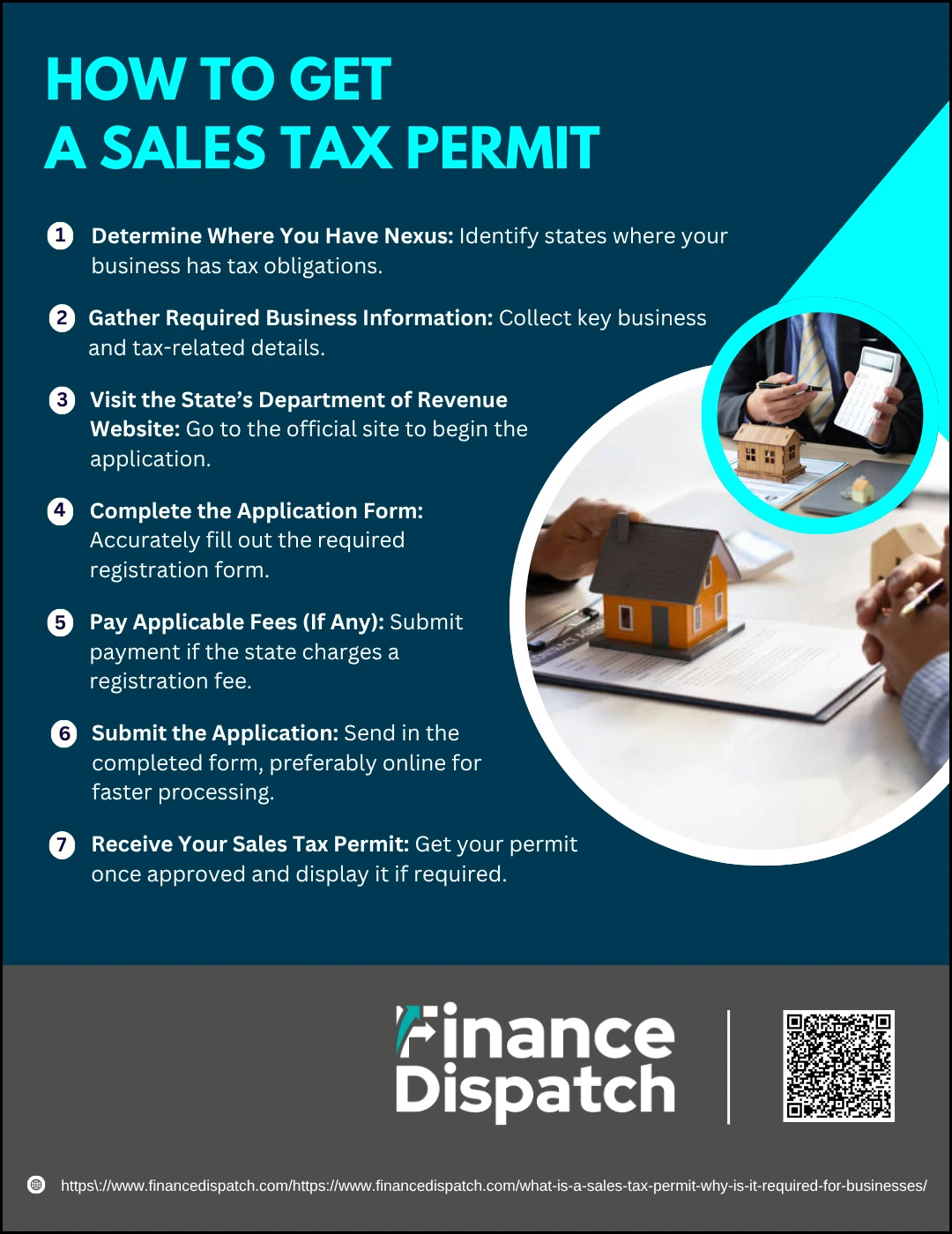If you sell taxable goods or services in the United States, whether online or in-person, a sales tax permit is one of the first legal requirements your business must fulfill. Also known as a seller’s permit, retail license, or sales and use tax permit, this official authorization allows you to collect sales tax from customers and remit it to the appropriate state tax authority. Without it, collecting sales tax is not only illegal but can also lead to severe penalties, including fines, interest charges, and possible business shutdowns. As the rules surrounding sales tax grow increasingly complex—especially with the rise of e-commerce and multi-state sales—understanding the purpose and process of obtaining a sales tax permit is more important than ever for business compliance and operational success.
What is a Sales Tax Permit?
A sales tax permit is an official authorization issued by a state’s tax authority that allows a business to collect and remit sales tax on taxable goods and services. Often referred to as a seller’s permit, retail license, or sales and use tax permit, it is a legal requirement for businesses operating in states that impose sales tax. When a business holds this permit, it acts as an intermediary, collecting sales tax from customers at the point of sale and forwarding it to the state. This permit not only legitimizes the business in the eyes of tax authorities but also ensures proper compliance with state laws, helping avoid fines, audits, or legal complications. Whether you’re running a brick-and-mortar store, an online shop, or selling through a marketplace, a sales tax permit is essential if you have a tax obligation in any state.
 Why Do Businesses Need a Sales Tax Permit?
Why Do Businesses Need a Sales Tax Permit?
A sales tax permit plays a crucial role in ensuring businesses comply with state tax laws and operate legally when selling taxable goods or services. Whether you sell online, at physical locations, or through marketplaces, having this permit is essential for collecting, reporting, and remitting sales tax appropriately. Here’s a detailed breakdown of why your business needs one:
1. Legal Compliance
Nearly every state that imposes a sales tax requires businesses to obtain a sales tax permit before collecting any tax from customers. Selling taxable products or services without this permit is illegal. By registering for a permit, a business acknowledges its obligation to follow state tax laws, reducing the risk of violating regulations that could result in audits or enforcement actions.
2. Authorization to Collect Tax
A sales tax permit grants a business the official authority to collect sales tax on the state’s behalf. This means that when customers pay tax at the point of sale, the business is legally acting as a tax collector. Without this permit, collecting sales tax is unauthorized—even if the business intends to remit it later.
3. Avoid Penalties and Fines
Operating without a valid sales tax permit can lead to serious consequences. States can impose significant fines, charge interest on unremitted taxes, and even initiate legal proceedings. Some states, like California, may charge a 50% penalty for knowingly failing to register. Getting a permit in advance helps avoid these financial setbacks.
4. Facilitates State Reporting
A registered business is required to file sales tax returns on a monthly, quarterly, or annual basis—depending on the volume of sales. Having a permit streamlines this process, ensuring that the business is on the state’s radar and can file returns accurately and on time using its assigned tax account.
5. Builds Credibility
Customers, vendors, and suppliers often view a sales tax permit as a mark of legitimacy. It reassures customers that the business is properly established and compliant with state laws. Vendors may also require your permit number when making tax-exempt purchases or wholesale transactions.
6. Prevents Accidental Fraud
Collecting sales tax without a permit—even unknowingly—can be considered fraudulent. If a business collects tax and fails to remit it properly, this could be interpreted as tax evasion or theft. A permit helps protect businesses by clarifying their responsibilities and making their tax collection activities transparent and legal.
7. Required for Resale and Exemptions
In many states, having a sales tax permit is a prerequisite for issuing or accepting resale certificates. This allows businesses to buy goods tax-free when those goods are intended for resale. Without a permit, businesses might not qualify for these exemptions and could end up paying unnecessary taxes on inventory purchases.
 How to Get a Sales Tax Permit
How to Get a Sales Tax Permit
Getting a sales tax permit is a vital first step for any business selling taxable goods or services. Whether you’re a brick-and-mortar retailer, an online seller, or a service provider, this permit allows you to legally collect sales tax from customers and ensures you’re in compliance with state tax laws. While the application process varies by state, the overall steps are generally similar. Here’s a step-by-step guide to help you through it:
Steps to Get a Sales Tax Permit
1. Determine Where You Have Nexus
Identify the states where your business has a “nexus”—a significant connection that creates a tax obligation. This could be a physical presence (like a store, office, or warehouse) or economic activity (such as exceeding a revenue or transaction threshold in a state).
2. Gather Required Business Information
Prepare essential details for your application, including your business name, legal structure (LLC, sole proprietorship, etc.), federal Employer Identification Number (EIN) or Social Security Number (SSN), NAICS code, estimated monthly sales, and owner contact information.
3. Visit the State’s Department of Revenue Website
Each state has its own online portal where you can register for a sales tax permit. Look for the “Sales and Use Tax” section or “Register a New Business” link on your state’s Department of Revenue site.
4. Complete the Application Form
Fill out the application with accurate information. Depending on the state, you may also need to submit supporting documents such as your Articles of Incorporation, proof of business address, or bank account details.
5. Pay Applicable Fees (If Any)
While many states offer free registration, some charge a fee ranging from $10 to $100. Others may require a refundable security deposit or sales tax bond, especially for out-of-state or high-risk sellers.
6. Submit the Application
Submit your application online for the fastest processing. Paper submissions may be allowed but usually take longer. Always save a copy of your application and confirmation for your records.
7. Receive Your Sales Tax Permit
Approval times vary by state—some offer instant approval online, while others take a few days or weeks. Once approved, you’ll receive your sales tax permit via mail or electronically. Be sure to display it in your place of business if required.
Who Needs a Sales Tax Permit?
Any business that sells taxable goods or services and has a presence—physical or economic—in a state with sales tax must obtain a sales tax permit. This applies not only to traditional storefronts but also to online businesses, remote sellers, and even occasional vendors. The obligation to register arises when a business establishes “nexus,” which is a significant connection with the state. Nexus can result from activities like having a physical location, hiring employees, reaching a certain sales volume, or operating through a marketplace facilitator.
Here’s a breakdown of who typically needs a sales tax permit, based on the type of nexus they establish:
| Type of Nexus | Definition | Examples of Businesses Affected | Common Triggers |
| Physical Nexus | A physical presence in the state. | Brick-and-mortar stores, warehouses, local offices, trade show vendors | Owning/renting property, hiring in-state employees |
| Economic Nexus | A high volume of sales or transactions into the state, even without presence. | Online retailers, remote sellers | $100,000 in sales or 200+ transactions (varies by state) |
| Marketplace Nexus | Sales through third-party platforms that handle fulfillment and payment. | Sellers using Amazon, Etsy, Walmart Marketplace | Use of a registered marketplace with in-state sales |
| Click-Through Nexus | Referrals from in-state affiliates or websites. | Affiliate marketers, out-of-state e-commerce brands | Revenue from referral links in the state |
| Affiliate Nexus | Having a related entity or partner in the state. | Businesses with franchise partners or subsidiaries | Ties to affiliated business within the state |
| Temporary Nexus | Selling occasionally or temporarily in the state. | Craft fair vendors, festival sellers, short-term pop-up shops | Selling at three or more events in a year (state-specific) |
Common Misconceptions about Sales Tax Permits
Many business owners misunderstand the rules and responsibilities surrounding sales tax permits, leading to costly errors and compliance issues. These misconceptions often stem from confusing terminology, state-specific laws, and assumptions about online selling. Clearing up these misunderstandings is essential for staying compliant and avoiding penalties.
Here are some of the most common misconceptions about sales tax permits:
1. “I don’t need a permit because I sell online.”
Even if you run an online-only business, you may still need a sales tax permit in states where you have economic nexus—based on sales volume or transaction count.
2. “Sales tax permits are only for big companies.”
Businesses of any size, including sole proprietors and part-time sellers, may be required to obtain a permit if they meet a state’s nexus threshold.
3. “If a marketplace like Amazon collects tax, I don’t need a permit.”
While marketplaces often collect sales tax on your behalf, you may still need a permit if you also make direct sales or operate through other channels.
4. “Sales tax permits are the same as resale certificates.”
A sales tax permit allows you to collect and remit sales tax; a resale certificate allows you to buy items tax-free for resale. They serve different purposes.
5. “I only sell at events a few times a year, so I don’t need a permit.”
Some states require a temporary or occasional sales tax permit even for short-term or seasonal sales.
6. “Once I get a sales tax permit, I don’t have to do anything else.”
After obtaining a permit, you must file regular sales tax returns—even if no sales were made—until the permit is officially canceled.
7. “There’s a federal sales tax permit I can get for all states.”
Sales tax permits are issued at the state level. There’s no universal or federal permit that covers all U.S. states.
Penalties for Not Having a Sales Tax Permit
Operating a business without a required sales tax permit can lead to serious financial and legal consequences. Many business owners mistakenly assume they can start collecting sales tax without registering or believe their small operations won’t attract regulatory attention. However, state tax authorities take compliance seriously, and the consequences of noncompliance can be severe—even for minor infractions.
Here are some of the penalties businesses may face for not having a valid sales tax permit:
1. Fines and Civil Penalties
States can impose substantial fines on businesses that collect sales tax without a permit or fail to register when required.
2. Repayment of Uncollected Sales Tax
Businesses may be held liable for the full amount of uncollected tax, even if they didn’t charge customers at the time of sale.
3. Interest Charges
Interest can accrue on unpaid sales tax from the date it should have been remitted, significantly increasing the total amount due.
4. Backdated Tax Obligations
Some states will backdate your registration to the date you first established nexus, meaning you’ll owe tax retroactively.
5. Criminal Charges for Fraud
collecting sales tax without remitting it can be classified as tax fraud or theft in certain states, potentially resulting in misdemeanor or felony charges.
6. Business License Suspension or Revocation
Failure to comply with sales tax regulations can lead to suspension or loss of your business license or permit to operate.
7. Audit Risk and Enforcement Actions
Operating without a permit increases the likelihood of audits, investigations, and enforcement actions by state tax authorities.
Maintaining and Renewing Your Permit
Once you’ve obtained a sales tax permit, your responsibilities don’t end there. Ongoing compliance is essential to keep your business in good standing with state tax authorities. This includes tracking changes in your business, filing timely sales tax returns, and renewing your permit if required. Neglecting these responsibilities can lead to fines, account suspension, or even forced closure of your business.
Here are key tasks involved in maintaining and renewing your sales tax permit:
1. File Sales Tax Returns Regularly
Even if you didn’t make any taxable sales during a filing period, most states still require you to submit a zero-dollar return.
2. Remit Collected Sales Tax on Time
States assign a filing frequency—monthly, quarterly, or annually—based on your sales volume. Always remit taxes by the due date.
3. Update Business Information Promptly
Report changes such as a new business address, owner, or legal structure to ensure your records stay accurate and compliant.
4. Display Your Permit Properly
If required by your state, your sales tax permit should be visibly posted at your place of business.
5. Track Expiration and Renewal Dates
Some states issue permits that never expire, while others require renewal every 1 to 5 years. Mark renewal deadlines on your calendar.
6. Monitor Changes in Nexus
As your business expands or contracts, re-evaluate where you have nexus to determine if new permits are needed—or if any should be canceled.
7. Cancel When No Longer Needed
If you stop doing business in a state or fall below its nexus threshold, follow formal steps to cancel your permit and file a final return.
Sales Tax Permit vs Resale Certificate
Many business owners confuse a sales tax permit with a resale certificate, but these are two distinct documents that serve different purposes in tax compliance. A sales tax permit authorizes a business to collect and remit sales tax on taxable goods and services, while a resale certificate allows a business to purchase goods without paying sales tax—provided those goods are intended for resale. Understanding the difference is crucial to avoid improper tax handling and potential legal issues.
Here’s a side-by-side comparison to clarify the key differences:
| Feature | Sales Tax Permit | Resale Certificate |
| Purpose | Authorizes collection and remittance of sales tax | Allows tax-free purchases of goods intended for resale |
| Who Issues It | State tax authority | Provided by the buyer to the seller |
| Required For | Any business making taxable sales | Businesses buying inventory for resale |
| Used When | Selling taxable goods or services to customers | Purchasing inventory or wholesale items without paying sales tax |
| Legal Requirement | Mandatory in states where business has sales tax obligations | Optional, but required to avoid paying sales tax on resale purchases |
| How It’s Used | Collected from customers at point of sale, then remitted to state | Presented to suppliers instead of paying sales tax at purchase |
| Expiration/Renewal | May require renewal depending on the state | May expire or need periodic re-issuance depending on the state |
Conclusion
A sales tax permit is a foundational requirement for any business selling taxable goods or services. It not only authorizes you to collect and remit sales tax but also keeps your operations legally compliant and financially protected. From understanding who needs a permit to navigating the application process and maintaining compliance, every step plays a vital role in responsible business management. By avoiding common misconceptions and staying on top of renewal obligations, you can ensure that your business remains in good standing with state tax authorities. Whether you’re a small startup or a growing e-commerce brand, securing and properly managing your sales tax permit is essential for long-term success.



